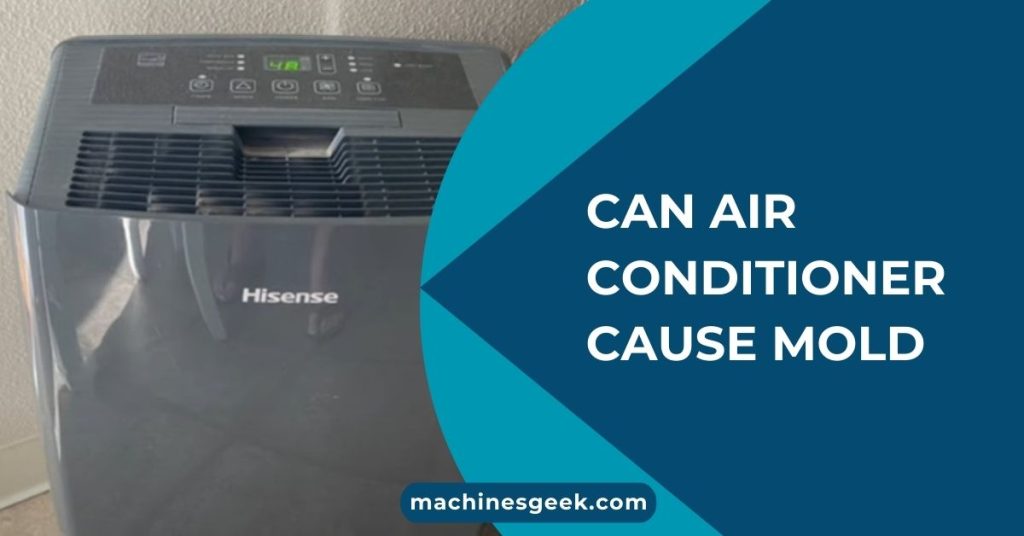Can Air Conditioner Cause Mold? Yes, air conditioners can cause mold. When the indoor unit’s evaporator coils become very cold, condensation can occur and create a damp environment that promotes mold growth.
The Relationship Between Air Conditioners And Mold Growth
The relationship between air conditioners and mold growth is a common concern for many homeowners. One factor that can contribute to mold growth in air conditioning systems is condensation on the evaporator coils.
While these coils are designed to remove water outside, in humid environments, they can produce enough condensation to promote mold growth. Another factor is insufficient insulation in the AC system, which can create a breeding ground for mold.
When the insulation deteriorates due to exposure to moisture, the refrigerant lines become vulnerable to mold growth.
If left unchecked, mold growth in air conditioning systems can lead to various problems, including increased energy consumption and the spread of mold to other areas of the house.
However, it’s important to note that air conditioners also help prevent mold growth by dehumidifying the air and keeping the indoor environment dry.
Preventive Measures To Avoid Mold Growth In Air Conditioners
Excessive moisture and poor maintenance can contribute to mold growth in air conditioners. Regular maintenance and cleaning of the AC system is crucial to preventing mold. Cleaning the air filters and coils, removing debris, and inspecting for water leaks are important steps in preventing mold growth.
Controlling indoor humidity levels is also essential, as high humidity provides a favorable environment for mold. Using a dehumidifier or venting moisture-producing appliances can help maintain optimal humidity levels.
Proper insulation of air conditioning components is another preventive measure. Insulating refrigerant lines and ensuring proper drainage can minimize condensation, reducing the chances of mold growth.
By following these preventive measures, you can avoid mold growth in your air conditioner and maintain a healthy indoor environment.
Signs And Symptoms Of Mold Growth In Air Conditioners
One common sign of mold growth in air conditioners is an unpleasant odor emanating from the AC system. This odor is often described as musty or earthy and is a result of mold spores circulating in the air.
Another sign is visible mold growth in and around the AC unit. Mold can form on the evaporator coils, ducts, and even the air filters, presenting a physical manifestation of the problem.
Mold growth in air conditioners can also lead to allergies and health issues for individuals using the AC system. Breathing in mold spores can trigger allergic reactions such as sneezing, coughing, and respiratory distress.
People with asthma or other respiratory conditions may experience worsened symptoms when exposed to mold.
Taking Action: Dealing With Mold In Air Conditioners
When dealing with minor cases of mold in air conditioners, there are a few techniques that you can try before considering professional help. First, you can use a mixture of bleach and water to clean the affected areas.
Apply the mixture using a spray bottle and scrub the surface with a brush. Make sure to wear protective gloves and a mask during the process. Another option is to use vinegar, which has natural antimicrobial properties.
Simply spray the vinegar onto the moldy areas and let it sit for a few hours before wiping it off. This method is safe and effective for minor mold infestations.
Steps to Prevent Mold Reoccurrence After Remediation
Once you have successfully removed the mold from your air conditioner, it is important to take steps to prevent its reoccurrence. Start by regularly cleaning and maintaining your AC unit.
This includes replacing filters, checking for any leaks or condensation, and making sure the unit is properly insulated. In addition, keep the humidity levels in your home in check. Use a dehumidifier if necessary and ensure good ventilation throughout your house.
Lastly, consider investing in a mold-resistant air filter for your AC unit. These filters are designed to trap and prevent mold spores from entering your home, providing an extra layer of protection against mold growth.
Can Mold from an Air Conditioner Cause Coughing?
Yes, mold from an air conditioner can cause coughing. When mold spores are circulated through the air conditioner, they can trigger coughing, especially in individuals with allergies or respiratory issues. It’s essential to address any air conditioner coughing causes promptly to prevent further health issues.
Frequently Asked Questions
Can My Air Conditioner Cause Mold In My House?
Yes, your air conditioner can cause mold in your house. When the unit is not properly maintained or if your home is humid, condensation can accumulate and create a moist environment that promotes mold growth. It is important to regularly clean and maintain your air conditioner to prevent mold formation.
Can Running Your AC Cause Mold?
Running your AC can cause mold if your house is humid. When your central AC system becomes very cold, it can create condensation that promotes mold growth. Proper insulation and maintenance of your AC system can help prevent mold.
Does Leaving Ac On Prevent Mold?
Leaving the AC on prevents mold by dehumidifying the air and keeping the environment inside the home dry. This prevents the growth of mold within your home.
Conclusion
To summarize, an air conditioner can indeed cause mold growth in certain conditions. The condensation that naturally occurs on the evaporator coils can promote mold growth if the environment is humid. Additionally, if the AC system is not adequately insulated, it can become a breeding ground for mold.
It is crucial to properly maintain and dehumidify your AC system to prevent mold growth and ensure a healthy indoor environment.








